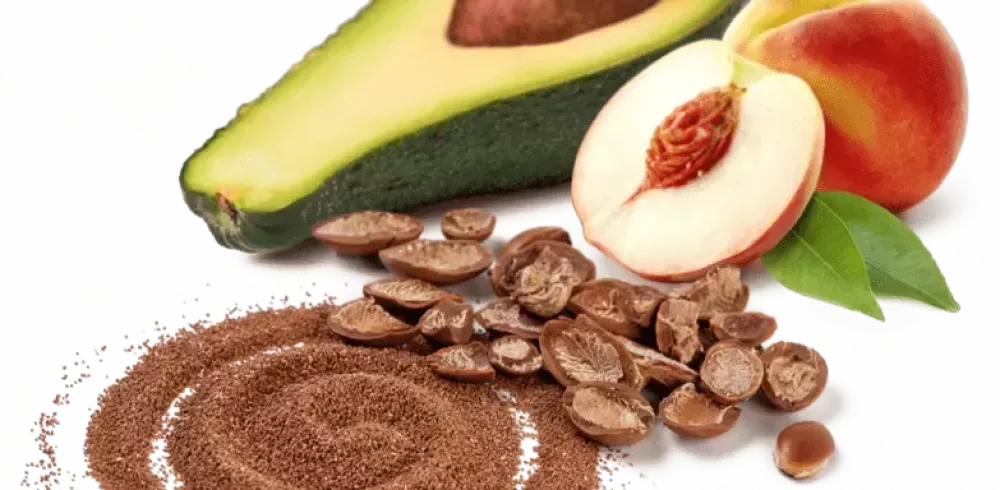Founded in 2017 by an international team in Spain and Malta, BioPowder is a specialist for upcycled by-products. With decades of experience in the biomass industry, BioPowder’s team has developed techniques to transform fruit kernels and shells into multifunctional additives. Specifically, they manufacture particles in micrometric ranges from side-streams like olive stones, a residue from the olive oil production. The result is powders and granules with unique functional properties. End applications include high-performance coatings such as protective paints, floorings and adhesives.
Olive stone powders: a carbon neutral resource from a circular process
The raw material used for the company’s bio-particles might still be unknown to professionals in Northern countries: olive stones. In Mediterranean countries – Spain in particular – an entire industry has emerged to upcycle the solid residues from the olive oil production. According to the International Olive Council, over 3 million kg of olives were produced and harvested during the 2022/23 season. As the lion’s share is processed into extra virgin olive oil, several hundreds of thousands of tons of olive stones were given a second life through upcycling value chains.
The fragmented stones result from crushing of the olive in the mill. Once the oil is extracted, a solid paste, consisting of pulp, shell and stones, remains. This so-called olive cake is then broken down into its components and the stones undergo several cleaning and drying stages. Once the clean, dry olive pits are available, BioPowder applies grinding and sieving techniques to obtain particles in a wide range of micron sizes. The entire process occurs without the use of chemicals or synthetic additives in order to obtain a fully plant-based powder of food-grade quality.
Interestingly, olive stones are a source of bio-carbon. Or, in other words, the result of carbon capture by the olive tree, which can absorb up to 10kg of CO2 per kg of harvested olives (Source: International Olive Council). Taking into account the reduced carbon footprint of particle manufacturing and the CO2 emissions equivalent per kg of olive oil, it becomes clear that the olive ecosystem, i.e. all value streams involving oil and by-products, is carbon neutral or even carbon negative. With this in mind, the bio-powders can contribute to a reduced carbon footprint of composite materials besides enhancing their functional properties.
Application possibilities in surface treatment and coatings
Coating additives – performance paired with a myriad of design options
From protective paints to liquid flooring solutions: BioPowder micro particles can be incorporated in a wide range of resin formulations such as epoxies, acrylics, polyaspartics and polyurethanes. Innovators are going bio-based these days, which means that natural fillers and texturizers are gradually replacing the conventional solutions such as polymeric or mineral particles.
Olive stone particles stand out because of their mechanical properties. Due to their lignocellulosic composition, they have a low bulk density (550-650 g/cm3) but a relatively high hardness (approx. 3.5 on a Mohs scale). Oil and water absorption is significantly lower than for softer natural fibers like wood, wheat or cellulose. In technical coatings, these parameters can translate into a lighter weight and enhanced durability and abrasion resistance.
In adhesive formulations, for example polyurethane or silicon systems, bonding and curing can be enhanced by adding lignocellulosic particles. The market has seen a shift from conventional isocyanate-based systems to bio-based formulations, often made from plant-based polyols. While those formulations offer potential for reinforcement and texturing with olive stone particles, the latter also serve as a raw material for lignin extraction and synthesis of polyols.
In the design space, the trend goes towards nature-inspired surface looks and textures. Olive stones can be customized to reflect a wide spectrum of haptic and aesthetic experiences.
Biodegradable, allergen-free abrasives
In industrial blasting and polishing, consumables are made in conformity with equipment specifications, especially the nozzle sizes. Also, different particle diameters can have different degrees of abrasiveness, which is why oftentimes the end user requires a range of complementary micron sizes.
In contrast to glass, metallic or garnet particles, olive stone abrasives are compostable and therefore easy to dispose of. As opposed to nutshell grits, they are free of any nut allergens, which ensures compliance with applicable workplace safety requirements.
Functionalization and colour range
Olive stone particles have a porous surface and reactive properties due to the existing hydroxyl groups. This polarity makes them naturally compatible with other polar chemistries. Resin formulations, especially synthetic one, are often non-polar and have conventionally been filled with inert powders such as calcium carbonate.
To ensure compatibility when incorporating a natural grain in a polymer matrix, BioPowder has developed a range of functionalized particle solutions. Also, these surface treatments greatly increase the particles’ hydrophobicity so that they can work as additives in water-repellent formulations such as barrier coatings.
BioPowder seeks to position itself as an R&D partner for customers seeking to develop new formulations with an increased bio-content or to adapt existing formulations with the aim of adding natural particles.
The company has partnered with Gebrüder Dorfner GmbH & Co. Kaolin- und Kristallquarzsand-Werke KG, a German specialist for refinement and application of minerals and filler systems. The collaboration comes with the possibility to produce a range of colour particles to be applied in replacement of conventional quartz particles. These coloured granules, besides the functional fillers, can be incorporated in a wide range of composite materials, cementitious formulations and design applications.
As the industry continues to shift towards bio-based solutions, companies are encouraged to explore the potential of BioPowder’s bio-additives for sustainable and high-performance surface coatings. Embrace innovation with BioPowder’s upcycled olive stone particles, reducing environmental impact and transforming coatings for a greener future. Join the journey towards a more sustainable and eco-friendly approach to surface treatments.
For more information, visit www.bio-powder.com or email info@bio-powder.com.
Manufacturing & Engineering Magazine | The Home of Manufacturing Industry News
















